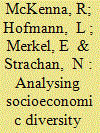|
|
|
Sort Order |
|
|
|
Items / Page
|
|
|
|
|
|
|
| Srl | Item |
| 1 |
ID:
150019


|
|
|
|
|
| Summary/Abstract |
Adequately accounting for interactions between Low Carbon Technologies (LCTs) at the building level and the overarching energy system means capturing the granularity associated with decentralised heat and power supply in residential buildings. The approach presented here adds novelty in terms of a realistic socioeconomic differentiation by employing dwelling/household archetypes (DHAs) and neighbourhood clusters at the Output Area (OA) level. These archetypes are combined with a mixed integer linear program (MILP) to generate optimum (minimum cost) technology configurations and operation schedules. Even in the baseline case, without any LCT penetration, a substantial deviation from the standard load profile (SLP) is encountered, suggesting that for some neighbourhoods this profile is not appropriate. With the application of LCTs, including heat pumps, micro-CHP and photovoltaic (PV), this effect is much stronger, including more negative residual load, more variability, and higher ramps with increased LCT penetration, and crucially different between neighbourhood clusters. The main policy implication of the study is the importance of understanding electrical load profiles at the neighbourhood level, because of the consequences they have for investment in the overarching energy system, including transmission and distribution infrastructure, and centralised generation plant. Further work should focus on attaining a superior socioeconomic differentiation between households.
|
|
|
|
|
|
|
|
|
|
|
|
|
|
|
|
| 2 |
ID:
151009


|
|
|
|
|
| Summary/Abstract |
The urge to adopt the proceedings at the recently concluded COP-21 with a binding legal status is indicative of the fact that nations now realise the seriousness of the issue, alike. The international community is just paving way for a low carbon, energy efficient planet. Rapid urbanisation has led to overpopulated cities that demand better quality of life for its residents. On the one hand, there is a global urge to reduce greenhouse gas emissions and on the other hand, the world is moving towards a ‘smart’ future. Both these suppositions are interspersed by a common goal of sustainable development. Alternately, the discussion tends to focus on use of clean energy technologies. Cities will be at the centre of this unique and unprecedented challenge. This research seeks to explore the role that city governance plays in climate mitigation and adaptation at the global level. Furthermore, the article examines and evaluates low carbon technology as a choice to be inculcated in encountering climate change hazards and essentially looks into the modus operandi of the transfer and diffusion of low carbon/clean energy technologies.
|
|
|
|
|
|
|
|
|
|
|
|
|
|
|
|
|
|
|
|
|